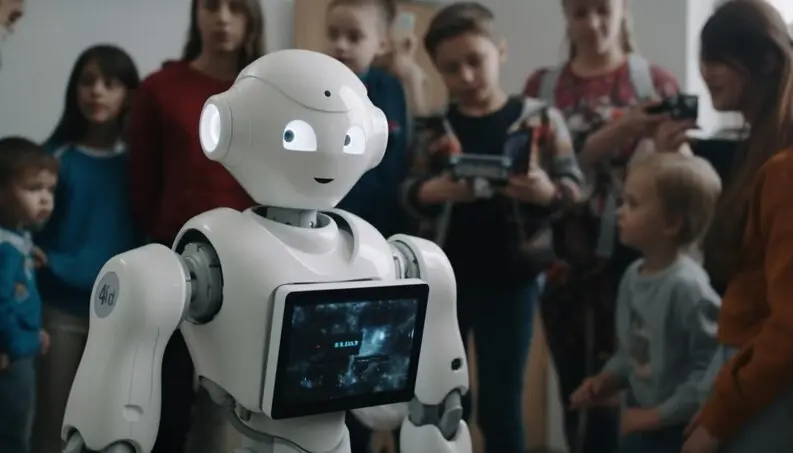
Introduction to AI in Everyday Life
Imagine waking up to a world where your morning routine is streamlined, efficient, and personalized. As you roll out of bed, your AI-powered personal assistant greets you with a friendly voice, ready to assist you every step of the way. From selecting your outfit to brewing the perfect cup of coffee, artificial intelligence applications are seamlessly integrated into your AI in Everyday Life, making it smarter, more convenient, and more connected than ever before.
In this article, we will explore the impact of AI in everyday life and how it is revolutionizing daily tasks, enhancing smart homes, and bringing efficiency to society’s routines. Through the lens of real-world examples and practical applications, we will uncover the ways AI is redefining our relationship with technology.
You may also be interested in reading Best Desired Skills For A Career In AI & Machine Learning » Moumentec
The Role of AI in Everyday Life
AI, or Artificial Intelligence, has become an integral part of our daily lives, seamlessly integrating into our routine tasks and making them more efficient. From personal assistants to recommendation systems, AI automation is transforming the way we accomplish everyday activities.
Personal Assistants and Voice Recognition
One of the most prominent examples of AI in Everyday Life is the rise of personal assistants like Amazon’s Alexa, Apple’s Siri, and Google Assistant. These AI-powered helpers use machine learning algorithms to understand and respond to voice commands, making information retrieval and task completion hands-free and convenient. Whether it’s setting reminders, playing music, or controlling smart home devices, personal assistants have become invaluable in simplifying our lives.
Recommendation Systems
AI-driven recommendation systems have revolutionized the way we discover content and make informed decisions. From personalized movie and music recommendations on streaming platforms to product suggestions on e-commerce websites, machine learning algorithms analyze our preferences and behavior to deliver tailored recommendations. This saves us time and effort, ensuring we find the most relevant options amidst the overwhelming amount of available choices.
Automation and Efficiency
AI automation has also enhanced several daily tasks, significantly improving efficiency. In industries such as manufacturing, logistics, and customer support, machine learning algorithms streamline processes, optimize resource allocation, and reduce human error. From chatbots capable of handling customer queries to automated production lines, AI is transforming various sectors and freeing up human labor for more creative and complex tasks.
By leveraging machine learning in daily tasks, AI enhances convenience, accuracy, and productivity. As AI technology continues to advance, we can expect even more seamless integration into our everyday lives, further streamlining our routines and unlocking new possibilities.

Enhancing Smart Homes with AI Technology
As artificial intelligence (AI) continues to advance, it has found its way into our homes, transforming them into smart environments that adapt to our needs. From security systems to energy management and entertainment, AI has integrated seamlessly into our daily routines, enhancing our lives in ways we never thought possible.
Integrating AI into Daily Routines
One of the key benefits of AI technology in smart homes is its ability to seamlessly integrate into our daily routines. With voice-controlled AI assistants like Amazon Echo and Google Home, we can now control various aspects of our homes with simple voice commands. Whether it’s adjusting the thermostat, turning on the lights, or playing our favorite music, AI has made daily tasks easier and more convenient.
AI in Smart Home Devices
The rise of smart home devices has revolutionized the way we interact with our living spaces. With AI-powered devices like smart thermostats, security cameras, and door locks, we can monitor and control our homes remotely, providing peace of mind and security. These devices use machine learning algorithms to learn our habits and preferences, adjusting settings automatically to ensure optimal comfort, energy efficiency, and safety.
Enhanced Security Systems
AI technology has significantly improved home security systems, making them more effective than ever before. AI-powered cameras can analyze video feeds in real-time, detecting and identifying potential threats. They can differentiate between humans, animals, and vehicles, reducing false alarms and providing accurate alerts. Additionally, AI-powered facial recognition technology allows for seamless access control, ensuring that only authorized individuals can enter the premises.
Efficient Energy Management
Smart homes equipped with AI technology can optimize energy usage, leading to cost savings and reduced environmental impact. AI-powered energy management systems learn our behavior patterns and adjust energy consumption accordingly. For example, smart thermostats can automatically adjust the temperature based on occupancy and weather conditions, ensuring energy efficiency while maintaining comfort.
Seamless Entertainment
AI has revolutionized entertainment in our smart homes. With AI-powered streaming services and recommendation systems, we can discover new movies, TV shows, and music tailored to our tastes. AI algorithms analyze our viewing and listening habits, providing personalized suggestions that keep us engaged and entertained.
| AI in Smart Homes | Benefits |
|---|---|
| Enhancing daily routines | Convenience and efficiency |
| Integrating smart devices | Remote control and optimization |
| Enhanced security systems | Reliable surveillance and access control |
| Efficient energy management | Cost savings and reduced environmental impact |
| Seamless entertainment | Personalized recommendations and engagement |
With AI technology seamlessly integrated into our smart homes, AI in Everyday Life become more efficient, convenient, and enjoyable. The possibilities for AI in our homes are endless, and as technology continues to advance, we can expect even more innovative applications that enhance our daily lives.
AI’s Impact on Society

Artificial Intelligence (AI) has made significant strides in transforming various aspects of society. Its practical applications have brought numerous benefits to consumers and businesses, revolutionizing how we live and interact with technology.
One of the most significant impacts of AI on society is its ability to enhance the consumer experience. AI-driven products and services have empowered users with personalized recommendations, improved customer service, and streamlined processes. From personalized shopping suggestions on e-commerce platforms to intelligent voice assistants that simplify daily tasks, AI has become a vital tool for enhancing convenience and efficiency in our lives.
Furthermore, AI has revolutionized industries such as healthcare, transportation, and finance, enabling advanced diagnosis, optimizing logistics, and automating financial transactions. These advancements not only improve the quality of services but also have the potential to save lives, reduce costs, and increase overall productivity.
However, as AI continues to evolve and become more integrated into society, it also raises ethical concerns and challenges. Data privacy, bias in algorithms, and job displacement are among the key considerations that must be addressed. Striking a balance between technological progress and maintaining ethical standards is crucial to ensure that AI benefits everyone in society.
To gain a deeper understanding of the impact of AI on society, let’s take a closer look at some key aspects:
1. Economic Transformation
AI has the potential to reshape the job market and create new opportunities. While some roles may become obsolete due to automation, new professions will emerge as AI drives innovation and increased productivity across industries. Additionally, AI-powered analytics and insights provide businesses with valuable market intelligence, helping them make data-driven decisions and gain a competitive edge.
2. Healthcare Revolution
The healthcare industry has witnessed significant advancements with the integration of AI. From early disease detection to personalized treatment plans, AI algorithms can analyze vast amounts of medical data and assist physicians in making accurate diagnoses. AI-powered robotic surgery and remote patient monitoring are also transforming healthcare delivery, improving patient outcomes and accessibility to quality care.
3. Ethical Considerations
As AI becomes more autonomous and complex, ensuring ethical standards becomes paramount. Addressing issues such as algorithmic bias, transparency in decision-making, and data privacy is crucial to building public trust and embracing the full potential of AI. Governments, organizations, and technology developers must collaborate to establish guidelines and regulations that protect individuals and promote responsible AI deployment.
| Benefit | Explanation |
|---|---|
| Improved Efficiency | AI automates repetitive tasks, reducing human error and increasing overall efficiency. |
| Enhanced Personalization | AI-driven recommendation systems provide tailored experiences, satisfying unique preferences. |
| Advanced Decision-Making | AI algorithms analyze vast data sets and generate actionable insights, aiding decision-making processes. |
| Increased Safety | AI-powered technologies enhance safety in areas like autonomous vehicles, surveillance systems, and cybersecurity. |
Conclusion
In conclusion, artificial intelligence (AI) has transformed our daily lives. It has revolutionized the way we perform tasks, interact with technology, and live in our homes. From personal assistants and voice recognition systems to recommendation algorithms and automation, AI has made our lives easier and more convenient.
Moreover, AI technology has significantly enhanced our smart homes. With AI-powered security systems, energy management solutions, entertainment devices, and home automation, we can create customized and intelligent living environments that adapt to our needs.
As AI continues to advance, its impact on society will only grow. We can expect further advancements and new opportunities for innovation in various areas, such as healthcare, transportation, education, and more. However, with these advancements, we must also address the potential challenges and ethical considerations associated with AI adoption.
As we move forward, it is crucial to find a balance between harnessing the power of AI to improve our lives and ensuring responsible and ethical AI development and deployment. By doing so, we can fully leverage the potential of AI technologies while addressing concerns and safeguarding the well-being of individuals and communities.

FAQ
How is AI shaping our world?
AI is shaping our world by revolutionizing AI in Everyday Life, enhancing smart homes, and bringing efficiency to society’s routines. It is transforming industries such as healthcare, finance, transportation, and entertainment, enabling us to accomplish tasks more accurately and efficiently.
What are some applications of AI in Everyday Life?
AI is being integrated into daily tasks such as personal assistants, voice recognition, recommendation systems, and automation. Personal assistants like Siri and Alexa use AI algorithms to understand and respond to voice commands, while recommendation systems analyze user data to suggest products or content tailored to individual preferences.
How is AI enhancing smart homes?
AI is transforming homes into smart environments that adapt to our needs. It is used in security systems to detect and prevent intrusions, energy management systems to optimize energy usage, entertainment devices that personalize content recommendations, and home automation systems that control various aspects of the house such as lighting, temperature, and appliances.
What is the impact of AI on society?
The impact of AI on society is profound. Consumers benefit from AI-driven products and services that enhance convenience, efficiency, and personalization. It has revolutionized customer service, healthcare, transportation, and many other sectors. However, the widespread adoption of AI also raises ethical considerations and potential challenges related to privacy, job displacement, and bias.




